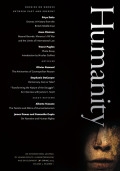HUMANITY VOLUME 2, ISSUE 1
 Like Carl Schmitt, we underline one undeniable yet discomforting fact: namely, that, to evoke a united humanity, no name works quite as well as that of the enemy of all. This fact constitutes one reason why, today, long after the obsolescence of legal debates on submarines, the specter of “universal enemies” remains. There will be talk of pirates as long as something called “humanity” goes to war.
Like Carl Schmitt, we underline one undeniable yet discomforting fact: namely, that, to evoke a united humanity, no name works quite as well as that of the enemy of all. This fact constitutes one reason why, today, long after the obsolescence of legal debates on submarines, the specter of “universal enemies” remains. There will be talk of pirates as long as something called “humanity” goes to war.
TABLE OF CONTENTS
A new road connects the towns of Siem Reap to Along Veng, in northern Cambodia; it now takes less then two hours from the temples of Angkor to reach the last bastion of the Khmer Rouge, in what used to be a dense jungle. It is enough time for my driver, thirty-one-year-old Vann, to tell me the story of his family.
Read More »
Visual documentation of the legacy of the Khmer Rouge.
Read More »
There will be talk of pirates as long as something called “humanity” goes to war.
Read More »
Due to copyright restrictions, this excerpt is available only in print or on Project Muse.
Read More »
On the moral and political economy of Somali piracy, as well as what its visibility and the effort to combat it reveal about world players.
Read More »
Even as Kenya imports the original ‘‘enemy of all’’—the pirate—it prepares to export to The Hague the new ‘‘enemy of all’’—the perpetrator of crimes against humanity.
Read More »
Two important new books, histories of the early modern period, are starkly different in their topics, approaches, and conclusions. Yet they both intersect the topic of piracy in its heyday.
Read More »
For demographic and historical reasons, there is no way to separate a discussion of the worst forms of child labor from the history of rural migration patterns.
Read More »
The ‘‘wars of national liberation’’ in the 1950s and 1960s posed new challenges to the International Committee in Geneva, because the humanitarian objective was repeatedly overlaid and endangered by Realpolitik.
Read More »
Despite the happy consciousness of those who proclaimed the end of history and the worldwide triumph of the liberal democracy in the early 1990s, the legitimating principles for domestic polities around the globe remain diverse.
Read More »
 Like Carl Schmitt, we underline one undeniable yet discomforting fact: namely, that, to evoke a united humanity, no name works quite as well as that of the enemy of all. This fact constitutes one reason why, today, long after the obsolescence of legal debates on submarines, the specter of “universal enemies” remains. There will be talk of pirates as long as something called “humanity” goes to war.
Like Carl Schmitt, we underline one undeniable yet discomforting fact: namely, that, to evoke a united humanity, no name works quite as well as that of the enemy of all. This fact constitutes one reason why, today, long after the obsolescence of legal debates on submarines, the specter of “universal enemies” remains. There will be talk of pirates as long as something called “humanity” goes to war.